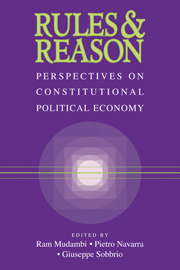PART I - CONSTITUTIONAL THEORY
Introductory Note
Published online by Cambridge University Press: 05 June 2012
Summary
Part I is made up of contributions that examine the theoretical underpinnings of constitutional political economy. Do constitutions matter? Mueller's answer to this fundamental question is that they can matter, although they do not necessarily do so. The many Brazilian constitutions have had limited impact. In the former USSR, the constitution had some admirable sounding sections but did not produce an admirable political system. In contrast, ancient Athens, the Weimar Republic, and Costa Rica are three cases where constitutions have had important effects. The main message of this chapter is that written constitutions can matter in how well the political institutions of a country function.
Vanberg focuses on economic systems and the framework of rules and institutions that constrain the actions and transactions of economic agents. He argues that this framework, which may be called an “economic constitution,” determines the ability of the system to adapt to a changing environment. This insight is used to analyze the current debates on globalization and the conflict between protectionist and competitive interests. The analysis of Buchanan and Yoon can be understood as a more abstract approach to the issue of a changing environment. In particular, dropping the “natural” distinction between rules (constraints) and outcomes within such rules, the argument is made for choosing constitutional variables (constraints) based on efficiency considerations.
The bipolar world during the Cold War pitted the free democracies of the West against socialist dictatorships. During this period, the socialist states offered the Hobbesian goal of order, while the democracies adopted the Lockeian perspective.
- Type
- Chapter
- Information
- Rules and ReasonPerspectives on Constitutional Political Economy, pp. 7 - 8Publisher: Cambridge University PressPrint publication year: 2001
- 1
- Cited by



